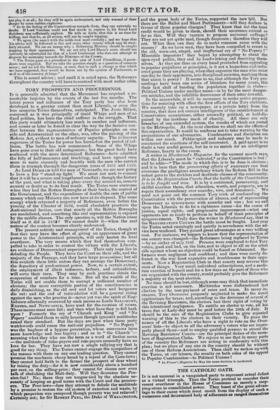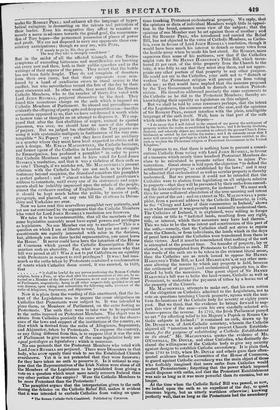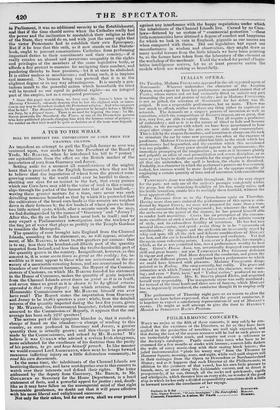THE CATHOLIC OATH.
IT is not unusual in a vanquished party to represent actual defeat as a virtual triumph. Thus the Tories pretend to consider their recent overthrow in the House of Commons as merely a step- ping-stone to consolidated power. They boast of the great advan- tage to their cause which roust result from the display of such a numerous and determined body of adherents as ranged themselves under Sir RouEssr PEEL; and exhaust all the language of hyper- bolical eulogium in descanting on the talents and patriotism of their leader. Even his resignation they affect to consider as merely a move in advance towards the grand goal, the consumma- tion of Tory hopes—the permanent possession of places of power and profit. We are not disposed to envy our opponents these con- solatory anticipations; though we may say, with POPE,
" If merely to go in, Sir, they go out, The way they take is strangely roundabout."'
But in the midst of all the affected triumph of the Tories, symptoms of exceeding bitterness and mortification are bursting
out every now and then, both in their public speeches and in the writings of their organs of the press. They assert that the battle has not been fairly fought. They do not complain of deserters
from their own camp, but that their opponents were rein- forced by a band of auxiliaries sworn to stand neuter in (be conflict, but who nevertheless turned the fate of the day by their most strenuous aid. In other words, they assert that the Roman Catholic Members, who to the number of thirty-five voted with Lord JOHN RUSSELL, perjured themselves by the deed. They found this monstrous charge on the oath which is imposed on Catholic Members of Parliament. So absurd and groundless—so evidently the offspring ofparty spite and deep mortification—has this accusation appeared to us, that we have not deemed it worth while to bestow time or thought on an attempt to disprove it. We sup- posed that after the first ebullition of anger, natural to ejected placemen, was over, we should hear no more of this charge of perjury. But we judged too charitably : the Tory papers are using it with systematic malignity in furtherance of the very con- temptible " No Popery •' cry : and they have found an auxiliary in a quarter where they must have least expected to obtain aid in such a design. Mr. ENEAS MACDONNELL, the Catholic barrister, and former agent of the Catholics in London during the struggle for Emancipation, has produced a pamphlet* in order to prove that Catholic Members ought not to have voted for Lord JOHN RUSSELL'S resolution, and that it was a violation of their oath so to vote ! Though, if we mistake not, Mr. MaenoNNELL's present relations with the Catholic body are not such as to place his testimony beyond suspicion, the Standard considers this pamphlet a perfect godsend ; and " almost wishes the learned gentleman's address to constitute, until every one of its statements and argu- ments shall be indelibly impressed upon the minds of the people, almost the exclusive reading of Englishmen." In other words, it should be kept much before the public, by means of puff, paragraph, and placard, at any rate till the eltetions in Devon- shire and Yorkshire are over.
Now we have read this marvellous pamphlet very patiently, and yet are not convinced by its arguments that the Catholic Members who voted for Lord JOHN RUSSELL'S resolution are forsworn.
We take it to be incontrovertible, that all the members of' the same legislative assembly must have equal powers and privileges as legislators. No one Member can say to another—" This is a question on which I am at liberty to vote, but you are not : your constituents are equally interested with mine in the decision, but, although you are their lawful representative, you must leave the House. It never could have been the intention of the House of Commons which passed the Catholic Emancipation Bill to sanction such an absurdity. For, what was the reason why that bill was passed at all ? Was it not to put Catholics on an equality with Protestants in respect to civil privileges? It was : but inas- much as the oaths taken by Protestants contained a condemnation of tenets which Catholics deem sacred, it was enacted, in 1829, that ..... . . "it shall be lawful for any person professing the Roman Catholic religion, being a Peer, or who shall after the commencement of this act, be re- turned as a Member of the House of Commons, to sit and vote in either House of Parliament, respectively, being in all other respects duly qualified to sit and vote therein, upon taking and subscribing the following oath, 1NSfEAD of the oaths of Allegiance, Supremacy, and Abjuration."
Now it is plain from the wording of this enactment, that the in- tent of the Legislature was to impose the same obligations on Catholics that Protestants were subject to. It was intended to place them, as Members of Parliament, on the same footing as Protestants. The oath they were to take was to be equivalent to the oaths imposed on Protestant Members. The object was to obtain from Catholics precisely the same security for the observ- ance of the laws and support of the institutions of the country, as that which is derived from the oaths of Allegiance, Supremacy, and Abjuration, taken by Protestants. To suppose the contrary, or any thing different from this, is to suppose that it was the aim of Parliament to give members of the same legislative body un- equal privileges as legislators ; which is nonsense. No one pretends that the Protestant Members who voted with Lord JOHN RUSSELL are perjured. There were Dissenters in that body, who avow openly their wish to see the Established Church overthrown. Yet it is riot pretended that they were forsworn; for they have taken no oath to preserve it. Is it rational to sup- pose that the Representatives of the Irish Nation were alone of all the Members of the Legislature to be prohibited from giving a vote on a question which must more nearly concern Ireland than any other portion of the empire? Were the Catholic Members to be more Protestant than the Protestants ?
The pamphlet argues that the interpretation given to the oath during the debates on the Catholic Relief Bill, makes it evident that it was intended to exclude Catholics from voting on ques- • The Roman Catholic Oath Considered. Published by CLIVE:ION.
tions touchiug Protestant ecclesiastical property. We reply, that the opinions or dicta of individual Members weigh little in opposi- tion to the broad, common sense view of the subject ; that the
opinions of one Member may be set against those of another ; and that Sir ROBERT PEEL, who introduced and carried the Relief Bill, has not objected to the votes of Catholic Members, as Catho- lics, even in favour of Lord JOHN RUSSELL'S resolution, though it would have been much his interest to detach so many votes from the hostile array when he made his last stand. Sir ROBERT, more sagacious than some of his partisans, saw that if the Catholics might vote for Sir HENRY HARDINGE'S Tithe Bill, which trans- ferred 25 per cent. of the tithe property from the Church to the laity, it was folly to say that they must stop there, and not appro- priate any other portion of that property to any other purpose. He could not say to the Catholics, your oath not to " disturb or weaken " the Protestant religion will prevent you from voting with me ; as that would have implied that the measure proposed by the Tory Government tended to disturb or weaken Protest- antism. He therefore addressed precisely the same arguments to the Catholic as he did to the Protestant Members; thereby ac- knowledging their equality as legislators on this subject. But we shall be told by sonic reasoners perhaps, that the intent of the Legislature, the common sense of the case, and the opinions of Sir ROBERT PEEL, cannot interfere with the plain, intelligible language of the oath itself. Well, here is that part of the oath which refers to the point in dispute- " I do swear that I will defend to the utmost of my power the settlement of property within the realm as established by the laws; and I do hereby disclaim, disavow, and solemnly abjure any intention to subvert the present Church Esta- blishment as settled by law within the realm ; and I do solemnly swear that I never will exercise any privilege to which I am or may become entitled, to dis- turb or weaken the Protestant religion or Protestant Government in the United Kingdom."
It appears to us, that there is nothing here to prevent a consci- entious Catholic from voting with Lord JOHN RUSSELL, in favour of a measure which nearly three hundred Protestant Members de- clare to be calculated to promote rather than to injure Pro- testantism. Great stress is laid upon the objection "to defend the settlement of property," as established by the laws;" and it may be admitted that ecclesiastical as well as secular property is thereby understood. But we presume it could not be intended that the Catholics were to abstain from legislating on all subjects relative to property—that they will be prevented by their oaths from amend- ing the laws relative to real property, for instance? We must seek then for some collateral elucidation of the true meaning and intent of this part of the act : and an extract in Mr. MACDO:SNELL'S pam- phlet, from a pastoral address by the Catholic Hierarchy, in 1826, to the "Clergy and Laity of their communion in Ireland," shows us in what manner it was generally and rationally understood then. The Catholics of Ireland, it is explained, were willing to forego any claim or title to "forfeited lands, resulting from any right. title, or interest, which their ancestors may have had therein: This we take to be the true intent and construction of this part of the oath,—namely, that the Catholics shall not strive to regain from the Church, or from individuals, the lands which in the days of penal laws against the Catholics were transferred from them to their victors. And it must be remembered that nothing of the sort is attempted at the present time. No transfer of property, lay or clerical, is contemplated from Protestants to Catholics as such. If the words of the oath are to be taken in the strictest literal sense, then the Catholics are as much bound to oppose Sir HENRY HARDINGE'S Tithe Bill, as Lord MELBOURNE'S, or any other mea- sure altering the tenure by which any property is held, because the settlement of property, and ecclesiastical property too, is dis- turbed by both the measures. One great object of Sir HENRY HARDINGE'S bill was to bribe the landowners, Catholic as well as Protestant, to undertake the payment of tithes by a bonus out or the property of the Church. Mr. MACDONNELL attempts to make out, that his own notion of the obligation on Catholics admitted to the Legislature, not to vote on questions touching Church property, agrees with the uni- form declarations of the Catholic body for seventy or eighty years past. But we think that the evidence he brings forward to sup- port this view of the case—even his own carefully-selected evi- dence—proves the reverse. In 1793, the Irish Parliament passed an act "for affording relief to his Majesty's Popish or Roman Ca- tholic subjects in Ireland:" it contained an oath, drawn up by Dr. DUIGENAN, of Anti-Catholic notoriety, wherein the Catholic abjured all "intention to subvert the present Church Establish- ment, for the purpose of substituting a Catholic Establishment in its stead." Mr. MACDONNELL quotes the evidence of Mr. O'CONNELL, Dr. DOYLE, and other Catholics, who distinctly de- clared the willingness of the Catholic body to give any security against designs to establish Catholic ascendancy. It is plain that, from 1793 to 1825, when Dr. DOYLE and others gave their often- quoted evidence before a Committee of the House of Commons, to guard against Catholic ascendancy was the main object of those who foolishly imagined that mere oaths from Catholics would protect Protestantism; forgetting that the power which imposed could dispense with oaths, and that the Protestant Establishment was safe as long as it was more powerful than its enemies, but no longer. At the time when the Catholic Relief Bill was passed, as now, we looked upon the oath as an expedient of the day, to quiet timorous bigots, but as utterly worthless otherwise ; knowing perfectly well, that as long as the Protestants had the ascendancy
in Parliament, it was no additional security to the Establishment, and that if the time should arrive when the Catholics really had the power and the inclination to reestablish their religion as that of the State, they would do so, and with just the same right that the victor Protestants had to establish their own Episcopacy. But if it be true that this oath, as it now stands on the Statute- book, ought to prevent conscientious Catholics from performing important duties to their constituents and their country,—if it really creates an absurd and pernicious inequality in the rights and privileges of the members of the same legislative body, or affords a fair pretext to enemies for maligning their conduct, and pandering thereby to base passions,—let it at once be abolished. It is either useless or mischievous ; and being such, it is impious and immoral. No human being can pretend that it is in the slightest degree or in any way advantageous. It is merely a gra- tuitous insult to the powerful nation which henceforth we trust will be treated as our equal in political rights—as an integral part of the empire, not as a conquered province.*
• Since this paper was written, we have seen Mr. SitEres letter in the Morning Chronicle, solemnly denying that he has the slightest wish or inten- tn in any way to disturb or weaken the Protestant religion. And who can prove that he has? The Stamford says, let the question be brought before a Middle.. sex Jury, by a feigned issue. Thete is no need for feigning the issue: let Mr. SHEIL prosecute the Standard, the Times, or any of the Devonshire parsons who have published placards charging him with the heinous crime of perjury— the verdict on that trial would he quite as decisive as if the issue were feigned.
























 Previous page
Previous page